Education, Skills, and the Labour Market
The research group explores the formation and impact of skills. It focuses on family background, formal education, and on-the-job training as determinants of skill development, and investigates the role of skills for labour market success over workers’ careers. The group also examines the evolving demand for skills due to technological advancements and structural change.
Research Cluster
Productivity and InstitutionsYour contact

- Department Structural Change and Productivity
Refereed Publications
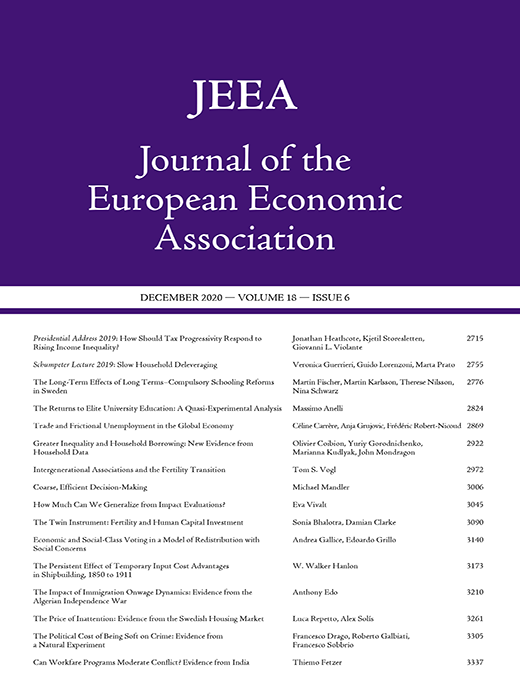
International Emigrant Selection on Occupational Skills
in: Journal of the European Economic Association, No. 2, 2021
Abstract
We present the first evidence on the role of occupational choices and acquired skills for migrant selection. Combining novel data from a representative Mexican task survey with rich individual-level worker data, we find that Mexican migrants to the United States have higher manual skills and lower cognitive skills than nonmigrants. Results hold within narrowly defined region–industry–occupation cells and for all education levels. Consistent with a Roy/Borjas-type selection model, differential returns to occupational skills between the United States and Mexico explain the selection pattern. Occupational skills are more important to capture the economic motives for migration than previously used worker characteristics.
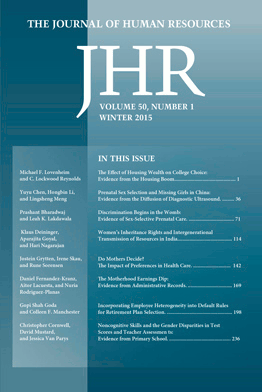
The Value of Smarter Teachers: International Evidence on Teacher Cognitive Skills and Student Performance
in: Journal of Human Resources, No. 4, 2019
Abstract
We construct country-level measures of teacher cognitive skills using unique assessment data for 31 countries. We find substantial differences in teacher cognitive skills across countries that are strongly related to student performance. Results are supported by fixed-effects estimation exploiting within-country between-subject variation in teacher skills. A series of robustness and placebo tests indicate a systematic influence of teacher skills as distinct from overall differences among countries in the level of cognitive skills. Moreover, observed country variations in teacher cognitive skills are significantly related to differences in women’s access to high-skill occupations outside teaching and to salary premiums for teachers.

Do Smarter Teachers Make Smarter Students?
in: Education Next, No. 2, 2019
Abstract
Student achievement varies widely across developed countries, but the source of these differences is not well understood. One obvious candidate, and a major focus of research and policy discussions both in the United States and abroad, is teacher quality.

Africa’s Skill Tragedy
in: Journal of Human Resources, No. 3, 2018
Abstract
We study the importance of teacher subject knowledge for student performance in Sub-Saharan Africa using unique international assessment data for sixth-grade students and their teachers. To circumvent bias due to unobserved student heterogeneity, we exploit variation within students across math and reading. Teacher subject knowledge has a modest impact on student performance. Exploiting vast cross-country differences in economic development, we find that teacher knowledge is effective only in more developed African countries. Results are robust to adding teacher fixed effects and accounting for potential sorting based on subject-specific factors.

Skills, Earnings, and Employment: Exploring Causality in the Estimation of Returns to Skills
in: Large-scale Assessments in Education, No. 12, 2017
Abstract
Ample evidence indicates that a person’s human capital is important for success on the labor market in terms of both wages and employment prospects. However, unlike the efforts to identify the impact of school attainment on labor-market outcomes, the literature on returns to cognitive skills has not yet provided convincing evidence that the estimated returns can be causally interpreted. Using the PIAAC Survey of Adult Skills, this paper explores several approaches that aim to address potential threats to causal identification of returns to skills, in terms of both higher wages and better employment chances. We address measurement error by exploiting the fact that PIAAC measures skills in several domains. Furthermore, we estimate instrumental-variable models that use skill variation stemming from school attainment and parental education to circumvent reverse causation. Results show a strikingly similar pattern across the diverse set of countries in our sample. In fact, the instrumental-variable estimates are consistently larger than those found in standard least-squares estimations. The same is true in two “natural experiments,” one of which exploits variation in skills from changes in compulsory-schooling laws across U.S. states. The other one identifies technologically induced variation in broadband Internet availability that gives rise to variation in ICT skills across German municipalities. Together, the results suggest that least-squares estimates may provide a lower bound of the true returns to skills in the labor market.
Working Papers
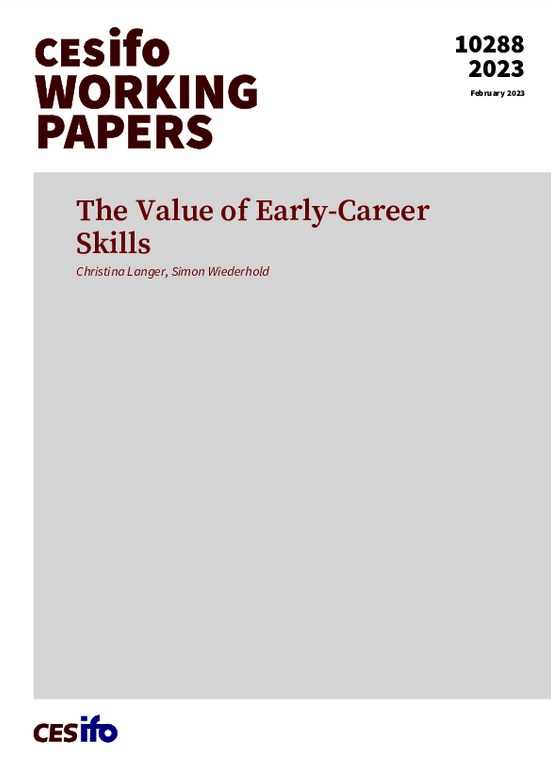
The Value of Early-Career Skills
in: CESifo Working Paper, No. 10288, 2023
Abstract
We develop novel measures of early-career skills that are more detailed, comprehensive, and labor-market-relevant than existing skill proxies. We exploit that skill requirements of apprenticeships in Germany are codified in state-approved, nationally standardized apprenticeship plans. These plans provide more than 13,000 different skills and the exact duration of learning each skill. Following workers over their careers in administrative data, we find that cognitive, social, and digital skills acquired during apprenticeship are highly – yet differently – rewarded. We also document rising returns to digital and social skills since the 1990s, with a more moderate increase in returns to cognitive skills.
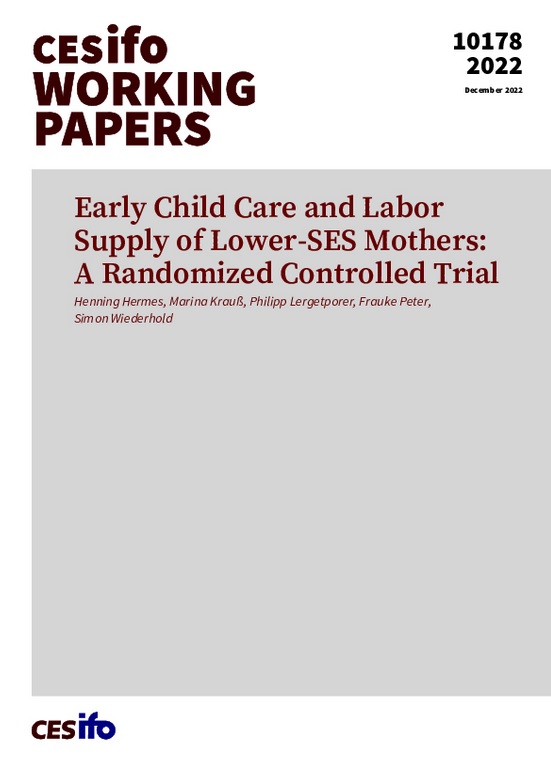
Early Child Care and Labor Supply of Lower-SES Mothers: A Randomized Controlled Trial
in: CESifo Working Paper, No. 10178, 2022
Abstract
We present experimental evidence that enabling access to universal early child care for families with lower socioeconomic status (SES) increases maternal labor supply. Our intervention provides families with customized help for child care applications, resulting in a large increase in enrollment among lower-SES families. The treatment increases lower-SES mothers' full-time employment rates by 9 percentage points (+160%), household income by 10%, and mothers' earnings by 22%. The effect on full-time employment is largely driven by increased care hours provided by child care centers and fathers. Overall, the treatment substantially improves intra-household gender equality in terms of child care duties and earnings.
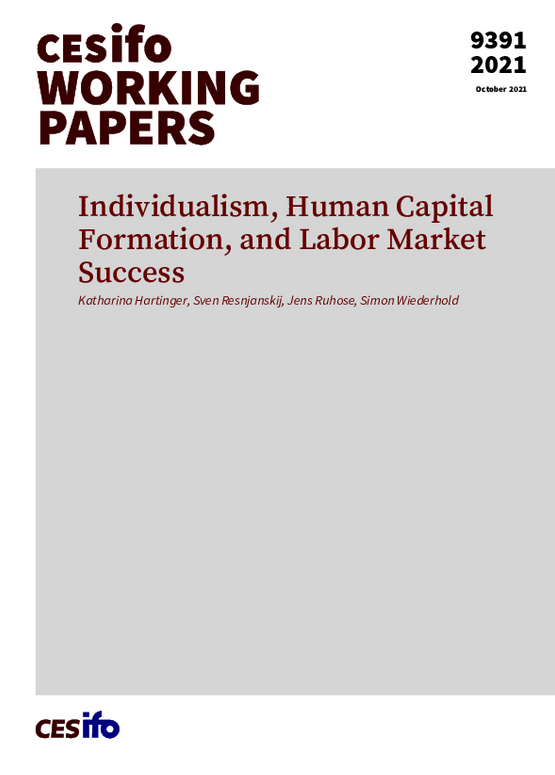
Individualism, Human Capital Formation, and Labor Market Success
in: CESifo Working Paper, No. 9391, 2021
Abstract
There is an ongoing debate about the economic effects of individualism. We establish that individualism leads to better educational and labor market outcomes. Using data from the largest international adult skill assessment, we identify the effects of individualism by exploiting variation between migrants at the origin country, origin language, and person level. Migrants from more individualistic cultures have higher cognitive skills and larger skill gains over time. They also invest more in their skills over the life-cycle, as they acquire more years of schooling and are more likely to participate in adult education activities. In fact, individualism is more important in explaining adult skill formation than any other cultural trait that has been emphasized in previous literature. In the labor market, more individualistic migrants earn higher wages and are less often unemployed. We show that our results cannot be explained by selective migration or omitted origin-country variables.
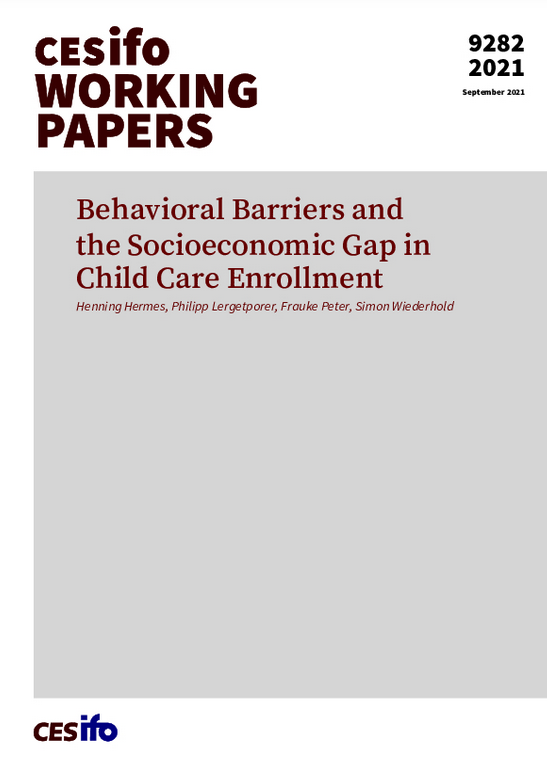
Behavioral Barriers and the Socioeconomic Gap in Child Care Enrollment
in: CESifo Working Paper, No. 9282, 2021
Abstract
Children with lower socioeconomic status (SES) tend to benefit more from early child care, but are substantially less likely to be enrolled. We study whether reducing behavioral barriers in the application process increases enrollment in child care for lower-SES children. In our RCT in Germany with highly subsidized child care (n > 600), treated families receive application information and personal assistance for applications. For lower-SES families, the treatment increases child care application rates by 21 pp and enrollment rates by 16 pp. Higher-SES families are not affected by the treatment. Thus, alleviating behavioral barriers closes half of the SES gap in early child care enrollment.
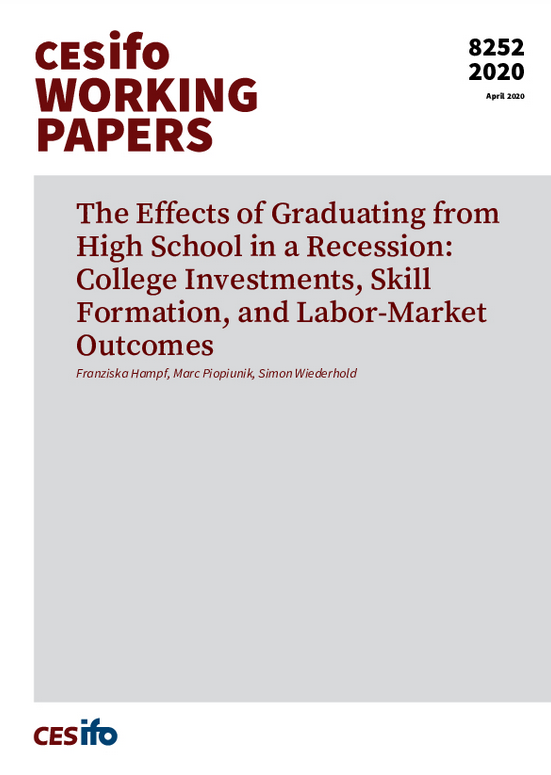
The Effects of Graduating from High School in a Recession: College Investments, Skill Formation, and Labor-Market Outcomes
in: CESifo Working Paper, No. 8252, 2020
Abstract
We investigate the short- and long-term effects of economic conditions at high-school graduation as a source of exogenous variation in the labor-market opportunities of potential college entrants. Exploiting business cycle fluctuations across birth cohorts for 28 developed countries, we find that bad economic conditions at high-school graduation increase college enrollment and graduation. They also affect outcomes in later life, increasing cognitive skills and improving labor-market success. Outcomes are affected only by the economic conditions at high-school graduation, but not by those during earlier or later years. Recessions at high-school graduation narrow the gender gaps in numeracy skills and labor-market success.












